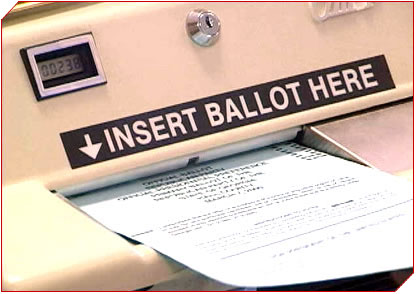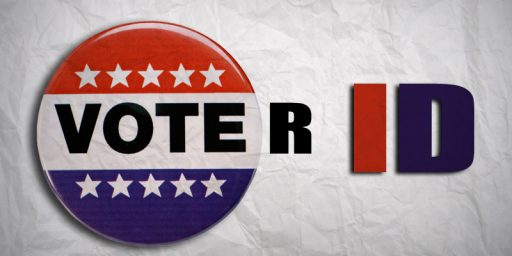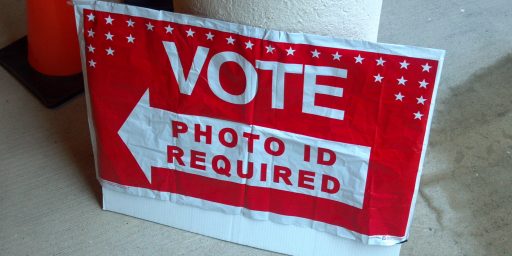Alphabet Soup Collision: PR at the UN by the NAACP over Voter ID
The voter ID issue goes on the road.
 Fox New reports: UN rights council delves into US voter I.D. laws
Fox New reports: UN rights council delves into US voter I.D. laws
The United Nations Human Rights Council is investigating the issue of American election laws at its gathering on minority rights in Geneva, Switzerland.. This, despite the fact that some members of the council have only in the past several years allowed women to vote, and one member, Saudi Arabia, still bars women from the voting booth completely.
Officials from the NAACP are presenting their case against U.S. voter ID laws, arguing to the international diplomats that the requirements disenfranchise voters and suppress the minority vote.
Now, let me start by saying that, yes, it is problematic (to the point of farcical) that the UN Human Rights Council includes members from some decidedly illiberal countries (to put it mildly) and who hardly have a worthy record on voting rights (e.g., China, Cuba, Saudi Arabia, and Uganda, to name just four).
Of course, I would further note that the powers of the UNHRC are as binding over US law as the Council of Local Dungeon Masters (Mom’s Basement Chapter) is over the governance of downtown Los Angeles. As such, the appropriate outrage should be equal to the actual significance of the action.
Here’s the deal though, in terms of a Memeorandum headliner: for many this is more about a reason to get upset (the UN! the NAACP!) than it is a serious issue. Because the bottom line is: it doesn’t really matter what the Council says on the matter.
However, I will say this, though, the proponents of voter ID are missing a major point: if they want to promote a free, easy to access ID card to guarantee full access to the ballot box for all citizens, then I don’t think that there would be any serious opposition. to ID laws. The issues if that at the moment there is a real problem with all citizens having adequate access to ID as I noted here in quoting a Michigan Law Review article from 2007:
studies on demographic disparities in photo identification focus largely on particular areas and localities. According to the Georgia chapter of the American Association of Retired Persons, for example, 36% of Georgians over age seventy-five lack a driver’s license. In 1994, the U.S. Department of Justice found that African- Americans in Louisiana were four to five times less likely than white residents to have government-sanctioned photo identification. Of the forty million Americans with disabilities, nearly 10% lack identification issued by the government (Overton 659).
These are real issues and therefore, going back to the Fox News article, I have to disagree with the following:
“The idea that this is a human rights abuse is ridiculous,” said Hans von Spakovsky, a voter fraud expert and senior legal fellow at the conservative Heritage Foundation, in Washington, D.C.
In fact a substantial number of citizens will have their access to the vote significantly curtailed then yes, it is a human rights issue. I do agree with Spakovky when he says “The UN allowing this to take place under their roof makes them, unfortunately, complicit in what really is a publicity stunt by the NAACP” insofar as there is no doubt that this is a publicity stunt. of course, one engages in such stunts to get publicity, so that’s the underlying motivator here.
I used to be in favor of the type of voter ID laws under discussion. After all, why shouldn’t people have to identify themselves when they vote? Then I started looking at numbers like those above and had to admit that the potential negative effects of such laws far outweigh the near-nonexistent positive effect of dealing with voter fraud. Back to the above-quoted law review article:
For example, a statewide survey of each of Ohio’s eighty-eight county Boards of Elections found only four instances of ineligible persons attempting to vote out of a total of 9,078,728 votes cast in the state’s 2002 and 2004 general elections. This is a fraud rate of 0.000044%.’ The Carter-Baker Commission’s Report noted that since October 2002, federal officials had charged eighty-nine individuals with casting multiple votes, providing false information about their felon status, buying votes, submitting false voter registration information, or voting improperly as a noncitizen. Examined in the context of the 196,139,871 ballots cast between October 2002 and August 2005, this represents a fraud rate of 0.000045% (and note also that not all of the activities charged would have been prevented by a photo- identification requirement) (Overton, 654).
Ok, so there are potentially millions of persons without ID to fight a fraud rate of 0.000045%. If one is honest about cost/benefit, then one cannot support the voter ID movement as it is currently constituted because at the moment we are looking at a pastiche of ad hoc rules. If one really, truly thinks that voter fraud (and only one type, since voter ID does not stop all kinds of potential voter fraud) then one has to argue for a national policy that guarantees adequate ID for all citizens (a move that also requires costs).
This is a situation that creates, by the way, conflicting political impulses. On the one hand, the move to create voter ID laws has been a Republican one. On the other hand, Republicans have been traditionally opposed to things like universal IDs and automatic voter registration. As with all public policy decisions, balancing of priorities needs to take place. It would also help the Republican position on this issue if they would find a way to explain how it just so happens that the groups of people most likely negatively affected by voter ID laws also happen to be Democrat-leaning constituencies (e.g., African-Americans, the poor, the elderly, etc.). Even if the motivation is a true fear of fraud, supporters have to deal with the practical effects of the policy.
It is not enough, by the way, to point out that people need IDs to buy alcohol or to board a plane. First, there is a substantial difference between commercial activities and voting (hint: voting is central to citizenship). Second, it is actually not true that one needs an ID to buy alcohol insofar as once one hits a certain age they stop asking for an ID. Indeed, the legal requirement is not for an ID to buy alcohol,* it is to be a certain age. The ID is simply a means of proving that age. Third, poor people of the type who are unlikely to have an ID are rather unlikely to be flying. Indeed, many, many people never fly so how this is analogous to voting is beyond me. In other words, just because one can cite examples of things that require/might require ID is not an argument for the current voter ID movement.
Back to the main story: yes, the NAACP is engaging in PR at the UNCHR about IDs (and thus the alphabet soup circle is complete). However, the ultimate issue here is not the UN nor is it the NAACP, it is whether or not the laws under discussion do run the risk of making it unnecessarily difficult to vote and what we ought to be doing about this fact.
—-
*Also: given that we known full well that kids often obtain fake IDs as a means of acquiring alcohol, I am not sure why this is supposed to be such a fantastic argument for voter ID laws.






For the debate that is about to ensue, let me suggest that everyone except two thing:
1. We all agree that we all want there to be 0 vote fraud and 0 disenfranchisement;
2. That, in the real world, steps to guarantee one of these goals will invariably hurt the possibilities of reaching the other goal.
@mattb: I think it is worth noting, also in terms of stipulation for a conversation, that not all moves are 1:1 ratios. A move to fix a small fraud problem can lead to a large disenfranchisement problem.
@ MattB.
There is already near-0 vote fraud. Goal accomplished. Next fake crisis please.
Hey…if the Heritage Foundation thinks everything is hunky-dory…then it must be. They would never take a partisan stand would they?
These laws have one goal…vote suppression…disenfranchisement…they and use a non-existent problem as a suppose justification.
I have one question: Why do Republicans hate Democracy?
In some cases, the voter id part is a distraction. We get bogged down in talking about how reasonable people can disagree about voter id laws and then we ignore the rather nakedly partisan and vote suppressing laws that get coupled with these things. Like florida also limiting early voting and making registration harder. Or Texas exempting the elderly from needing ID, but not allowing student ID’s to count.
I was looking at this site yesterday:
http://www.ncsl.org/legislatures-elections/elections/voter-id-state-requirements.aspx
Useful just so you get a sense for what various states have done. There is clearly a spectrum here. Some states have “strict photo ID” laws. Others will accept a ultilty bill, as it gives name/address.
I think the laws that keep the hoops easy to jump through are the best. There are a bunch of them.
I think the stricter laws are in serious danger of providing a cure that’s worse than the disease.
Oh wait…the Heritage Foundation has recieved over $4M from the Koch Brothers…yup…definitely a non-partisan observer.
Interesting that the anti-regulation freedom and liberty crowd is for regulating and llimiting the freedom and liberty of voters. The level of hypocrisy is awe-inspiring.
You’;ve got to admit that for oddities, inconsistencies, and ironies the UNHRC is a target-rich environment. You’ve already mentioned a couple but that’s barely scratching the surface.
Women didn’t receive the right to vote in Switzerland, a current member and where the meeting is being held, until 1976. You read that right.
Many if not most of current members require that one or both parents be nationals of the country to be a citizen of that country, i.e., jus sanguinis. That means that in France (not a present member) there are people whose grandparents, parents, and themselves were all born in France but who are not eligible to vote in France because they are not citizens of France.
The problem that the U. S. presents from a human rights standpoint is not the requiring of an ID. That’s a commonplace worldwide. It’s that there is no national ID and our laws are unevenly applied.
I think your underestimating the authority of the CLDM. While the LAMB Chapter itself is relatively powerless, the NCLDM has achieved the Paragon level of 20 and has influence over the affairs of not only the Prime Material plane, but that of the Astral Sea as well.
Entirely aside from the merits (or lack thereof) of voter ID laws, it seems a tactical mistake for the NAACP to get the UN involved. The UN isn’t held in particularly high regard in the US and if the push to overturn the laws becomes seen as being driven by foreign interests, a lot of people who don’t really care one way or the other are likely to take the pro-voter ID lawside out of pure contrariness.
@Dave Schuler:
Agreed.
And yes: the Swiss example is rather remarkable.
@Vast Variety: I stand corrected 😉
Bullseye.
Agreed.
The NAACP should focus on highlighting how poorly thought-out (or all too well thought out) voter ID laws can deny a citizen their right to vote.
I look at this from a cost POV. If we are living in a country with budget issues, and we are, we need to spend our money wisely. Given that voter fraud is very rare, the kind that could be potentially stopped with photo ID, why not spend where we get a better ROI. What fraud we do have really occurs with the election officials and with the ballot/computer election system. Let’s spend our money there.
Steve
I have to show some sort of id to get the following:
library card, fitness center, hospital procedures, doctor’s office, purchase prescription drugs,
enter a bar (yes, even at age 60), buy alcoholic drinks (I guess the bars are too dark),
get a license tag, get a driver’s license, get a season’s pass to the local theme park, get into a military base as a visitor, cash a check at a bank and many stores, load up newly purchased furniture, and the list goes on. The argument that is not a voter fraud problem can be met with the argument that this is a prevention measure against fraud. I am sure that there is not a widespread library book checkout fraud problem either. From what I hear about Chicago, they certainly need it.
They need everything they can get. Remember that Nixon would have been elected in 1960 if had not been for all kinds of crazy stuff going on in Chicago.
Oh, don’t forget: “vote early and often.”
Racehorse: none of those things are constitutional rights, though (and, actually, I think a hospital would treat you in an emergency if you had no ID/were unconcious).
Those of us concerned about voter ID laws worry about curtailing citizens constitutional rights by making it more difficult to vote, because a) we don’t see evidence this is a problem worthy of the proposed solution (depending on the restrictiveness and expense of the proposed solution); and/or b) we suspect ulterior motives.
Remember that Nixon would have been elected in 1960 if had not been for all kinds of crazy stuff going on in Chicago.
Woah, I’m messing up block quoting all over the place today. Reverse that.
I really do not know why everyone does not have a picture ID. Anyone over 18 should have one and senior citizens I would expect to get SS benefits would need one. Why give people a chance to call fraud get an ID and proudly display it while voting.
That said the other shenanigans some states are pulling to make it harder for people to vote I say knock it off Local news should spell it out for all and places to go to get ID for all without all this district changes and other things time restrictions BS.
@Hey Norm: They don’t hate democracy; Republicans hate losing elections. Repressing democracy is just the tool to accomplish the goal of winning.